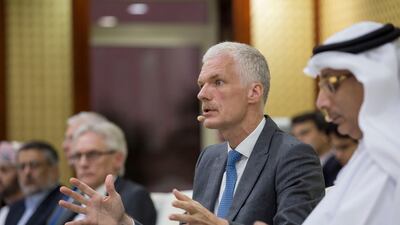The UAE needs to produce creative thinkers, not rote learners, if it is to climb to the top of the world rankings of the international assessment, Pisa, said the official who heads the exam.
“The kind of things that are easy to teach and easy to test are going to have less and less relevance in Pisa,” Andreas Schleicher, head of the OECD’s directorate of education and skills and co-ordinator of the Program for International Student Assessment (Pisa), said at the Qudwa 2017 Forum in Abu Dhabi.
“Pisa is not a test you can teach to. It rewards thinking skills. The best way to prepare your students for the test is to teach them well, to teach them to think, to teach them to work collaboratively – that’s the best preparation to give for Pisa," he said in an interview.
Pisa is issued to a random sample of more than 500,000 15-year-olds selected by the OECD around the world every three years to measure their reading, maths and science comprehension.
The UAE Government has listed the students’ rank in Pisa as one of the key education performance indicators in the UAE Vision 2021 National Agenda. The last time public and private school pupils from the UAE participated in 2015, they continued to score below the OECD average.
_____________
Read more from Qudwa 2017 Forum
Lack of high quality teachers leaves global education sector in 'crisis'
Emirati school model will be extended to private schools, says minister
_____________
In preparation for Pisa 2018, the Abu Dhabi Department of Education and Knowledge has prepared mock exams that it is issuing to all 15-year-old pupils in the emirate and beefed up teaching resources to get schools ready.
Mr Schleicher said the assessment has been challenging for this region because education here has historically been focused on memorisation and the reproduction of subject-matter content.
“The shift in education is really, really important,” said Mr Schleicher. “It’s easy to prepare the young people for our past, but we need to prepare them for their future. If this country is serious about a post-oil economy, it will have to really make education its number one priority.”
Last year, Pisa measured students’ financial literacy and collaborative problem-solving skills. In Pisa 2018, students will for the first time be assessed on their “global competency".
“This is the capacity of young people to see the world in different lenses, different perspectives, to appreciate different ideas, different cultures,” said Mr Schleicher.
"We require students to be able to not only be tolerant but to draw value out of diversity, to look at problems from different perspectives, lenses, appreciate different cultures, different ways of thinking – it’s one step further than just to be open and tolerant.”

